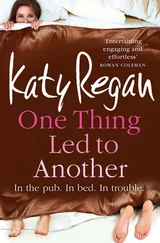Back in his lab at the university, Richard continues his research but finds himself, without warning, several times a week, hunched over his microscope, weeping. One of his lab assistants, Mei-ling, places a hand on his back in comfort and then goes back to her workstation when Richard’s sobs subside. They don’t speak about it.
IT IS BERNADETTE’S HOPE, WITH RICHARD GONE back to Riverside, that Lucia can now take the next necessary steps — finding an apartment of her own, a job. They had all agreed in the weeks before Lucia and Maggie showed up, during the many phone calls leading to their flight, that Max’s garage apartment would be a temporary refuge, “a way station,” as Bernadette referred to it when speaking with both Max and Lucia. But Lucia has seemed to have forgotten that agreement, or worse yet, and this is Bernadette’s fear — Lucia is stuck. It seems to Bernadette that all forward motion has stopped.
Max hasn’t complained — he’s generous and understanding that way — but Bernadette feels responsible for the disruption in what was an almost idyllic solitude that they both cherished.
BERNADETTE REALIZES SHE HAS TO do something. What she’d like to do is jolt Lucia into action, but she knows that probably isn’t the best way of approaching the situation. Change is hard , she keeps reminding herself in order to bolster her compassion level. What she needs to do is guide Lucia to the first step. It’s always the hardest, that first step.
With “guiding” in mind, with “easing” as her goal, Bernadette takes Lucia with her to the Santa Monica Farmers Market, the one she always goes to on Saturday mornings at Pico and Cloverfield, exactly across from the off-ramp Lucia and Maggie took when they got off the Santa Monica Freeway weeks ago. Fitting, isn’t it? Symbolic , Bernadette thinks.
It’s not the biggest of the farmers markets, but it’s in their neighborhood and Bernadette knows most of the vendors now by name. Of course, she stops and chats every few feet as they make their way through, Lucia following along in Bernadette’s wake, feeling like an afterthought.
And then there is the produce. Bernadette seems mesmerized by the varieties of heirloom tomatoes — yellow, pink, striped, blushing red. Huge tomatoes that must weigh more than a pound, tiny tomatoes that look like clusters of grapes. And the squash — zucchini in shades of green and black, crookneck squash in sun-bright yellow, pale green trombone squash that curves around itself almost three feet long. And eggplants in all colors — pink, lavender, white, deep purple that glows black. Bernadette is in her element. All the colors, the aromas! She picks up a bouquet of Thai basil and inhales its smell before putting it back. No one seems to mind.
As they walk, Bernadette chatters on about the “edible art,” as she calls all the gorgeous vegetables, and tries to figure out how to bring up the issue of Lucia’s unemployment. She can hardly say, “When are you going to do something about getting a job? How can you rent an apartment without any money?”
Instead she begins talking about Max’s oldest son, Danny, who teaches first grade at a charter school in East Oakland. How much he’s taken to teaching, how grateful Max is that his son has found what he loves to do.
“But the summers are hard,” Bernadette tells Lucia as they approach a vendor selling a kaleidoscope of sweet peppers. “They pay beginning teachers so little that he has to find a summer job. Each summer. There’s something wrong with that, don’t you think?”
Lucia agrees, but Bernadette can tell she’s not really listening. They’ve got to sit down and face each other so she can have all of Lucia’s attention. She steers her to a little outdoor café—really just a coffee cart and a few tables set up under a tree — and brings two lattes back to the table.
“Richard must be calling you,” Lucia says before Bernadette can even put their coffees down. “He’s harassing you, isn’t he?”
“Don’t worry about that.” Bernadette doesn’t want to have yet another conversation about Richard.
“Because we both know he can be ruthless.”
Bernadette needs to focus Lucia’s attention on her own situation. “He’s just venting—”
“He’s taking advantage of you. That’s what he does! He uses people—”
“Lucia, we don’t need to talk about Richard. It’s fine.… I wanted to tell you about Danny and this really interesting summer job he got.”
“Danny?” Lucia is having trouble shifting gears.
“Max’s oldest, who we were talking about.”
“Oh, yes. The teacher.”
“Right. And he got this research job with an educational think tank, something about different learning styles for different kids. Anyway, it dovetails beautifully with his real job and pays enough for him to get through the summer and he got it on Craigslist. Amazing, huh?”
“I’ve thought about Craigslist.…” Lucia says, a half sentence.
“Oh, it’s a great resource.” Bernadette tries to keep the relief out of her voice. “I think Danny met his partner on Craigslist, too, but he hasn’t ever really said that. Max and I guessed it, but maybe we’re wrong. And then Max found a lot of his beekeeping equipment there. You can find anything on Craigslist!” She puts a hand on Lucia’s hand, to reinforce what she’s about to say. “You know, Lucia, feel free to come in and use my computer whenever you want. There are just tons of jobs listed.”
“Oh, I will, thank you, Detta,” Lucia says.
And Bernadette lets it rest there, out on the table— You need to come in and start checking Craigslist for a job .
But Lucia doesn’t. Each day, as Lucia watches her child retreat further into herself, she grows more and more concerned and less and less capable of any purposeful movement.
Maggie’s eyes are usually downcast. She draws constantly or rereads the books Lucia has bought her since they’ve moved, flipping the pages over and over. Lucia’s initial response to her daughter’s speechlessness — her wait-and-see approach — no longer serves either of them.
She tries cajoling and bribes and pleading. Early in the morning when the two share the same pillow and look into each other’s eyes, Lucia whispers, “Please, sweetheart, tell me one thing.” But Maggie doesn’t. Any of the things she wants to say to Lucia, her mother doesn’t want to hear. Instead, Maggie chooses silence and her mother’s total attention. Something will happen, she feels it, if she doesn’t talk. She doesn’t know what it will be, but she’s betting that it will be better than what she’s got.
FROM RIVERSIDE, RICHARD HAS SETTLED on text messages now as his communication of choice. He’s able to send more carefully crafted diatribes, endless loops of accusations. Lucia’s steadfast refusal to change her mind has finally provoked Richard’s anger, and he focuses it where he knows it will hurt the most. Obviously, Lucia’s selfish and precipitous decision has caused Maggie’s problem; obviously, it’s not normal for a five-year-old child to suddenly stop talking; obviously, Lucia must get some help for Maggie. If she doesn’t, Richard will get a lawyer and force her to — it may be the one thing that Richard can make her do. Send me the bills, he texts her, but get Maggie some help. The message that she’s being a terrible mother is delivered loud and clear.
That’s how they end up at Dr. Greenstein’s. The recommendation came from Max, no stranger to the idiosyncratic ways children have of dealing with life’s vicissitudes. He enlisted Dr. Greenstein’s help after the death of his wife.
Maggie doesn’t resist going to the doctor’s office. There are lots of things to do there, games and puzzles, new books to read, and large pads of creamy drawing paper next to cups full of thick Magic Markers and crayons, some in colors she’s never seen before — fuzzy-wuzzy brown, atomic tangerine, screamin’ green, and her favorite, razzle-dazzle rose. If she can draw here, she’s fine. She can shut out the rest of the world. The doctor talks to her, and even though she knows she’s supposed to talk back, nothing happens when she doesn’t.
Читать дальше












